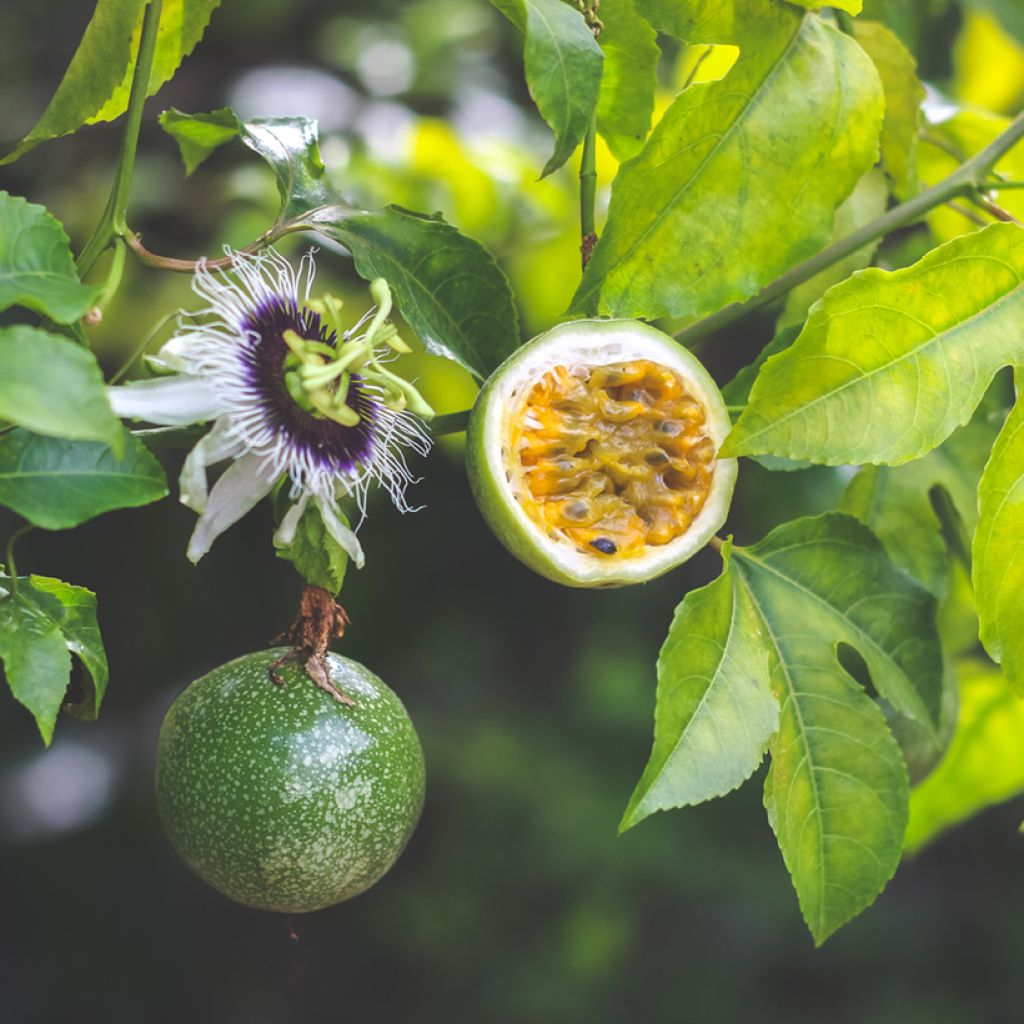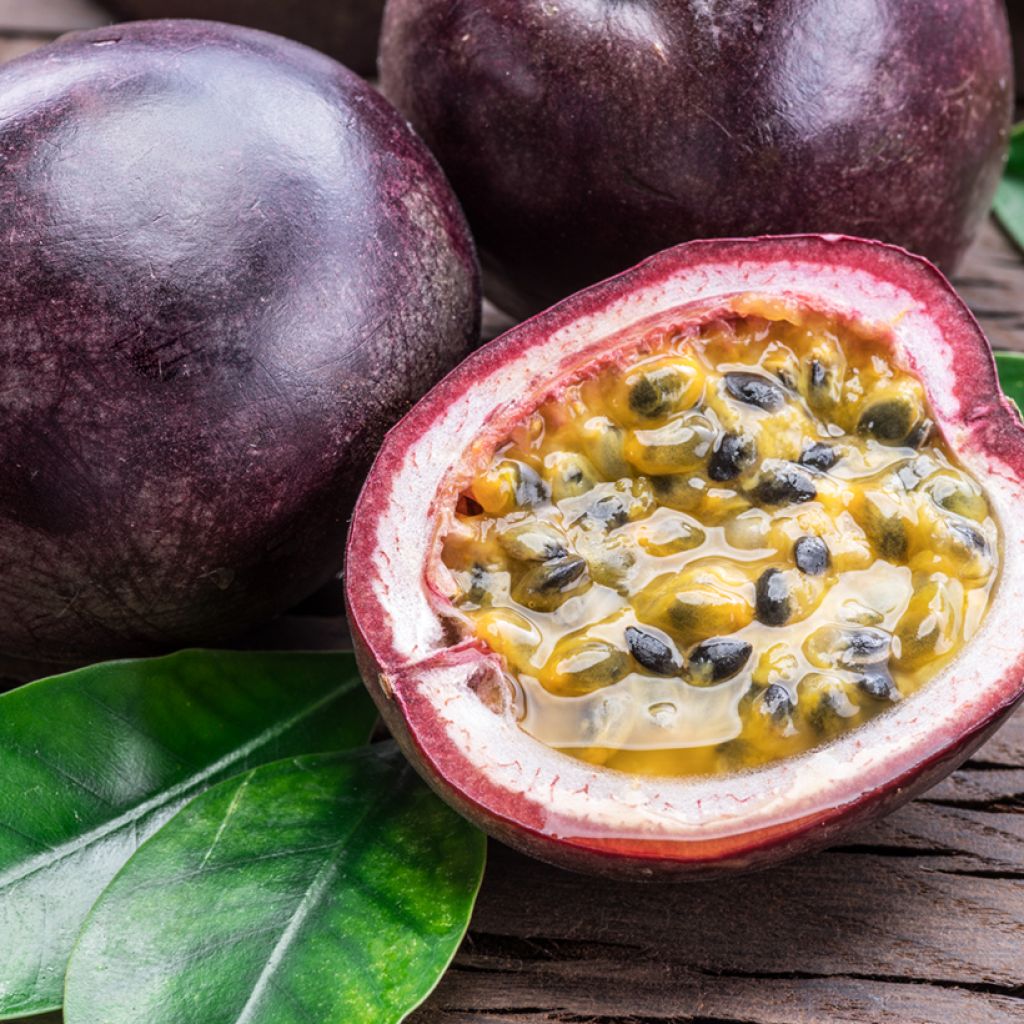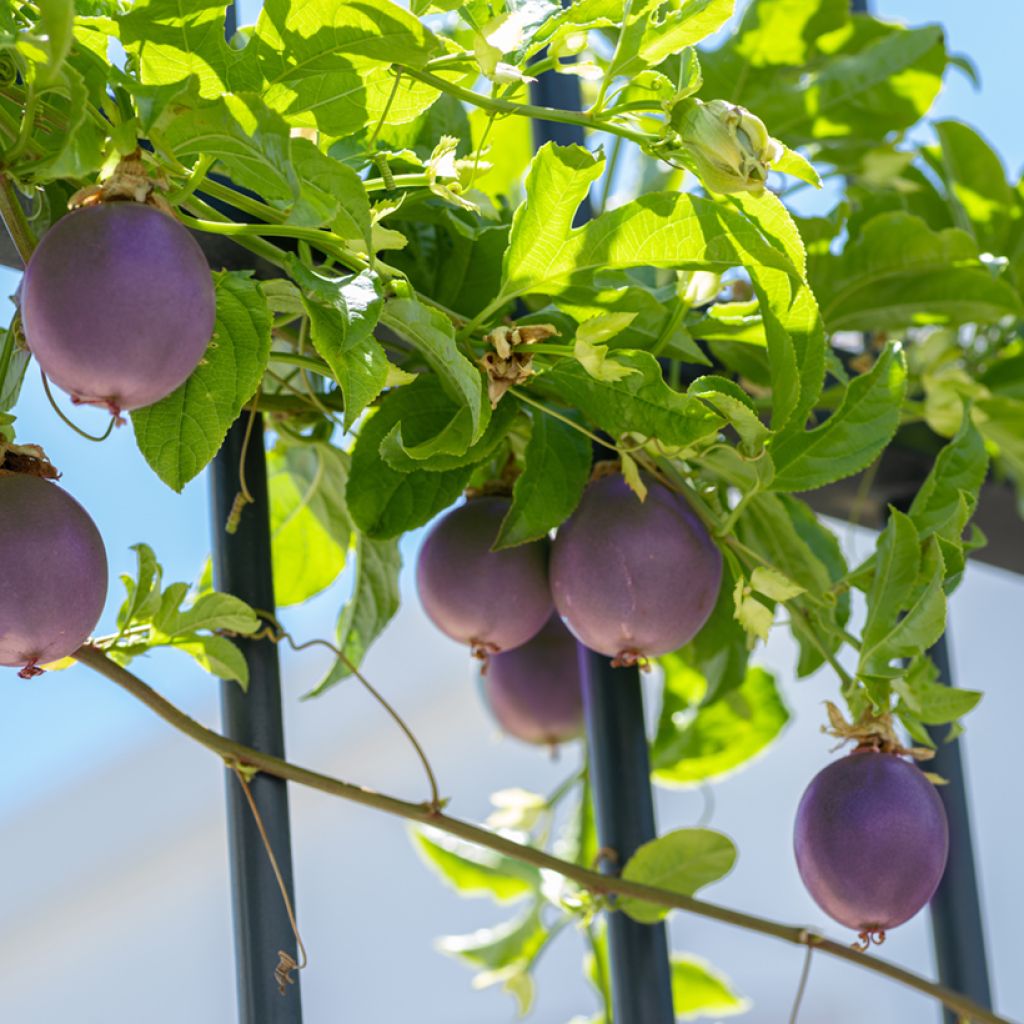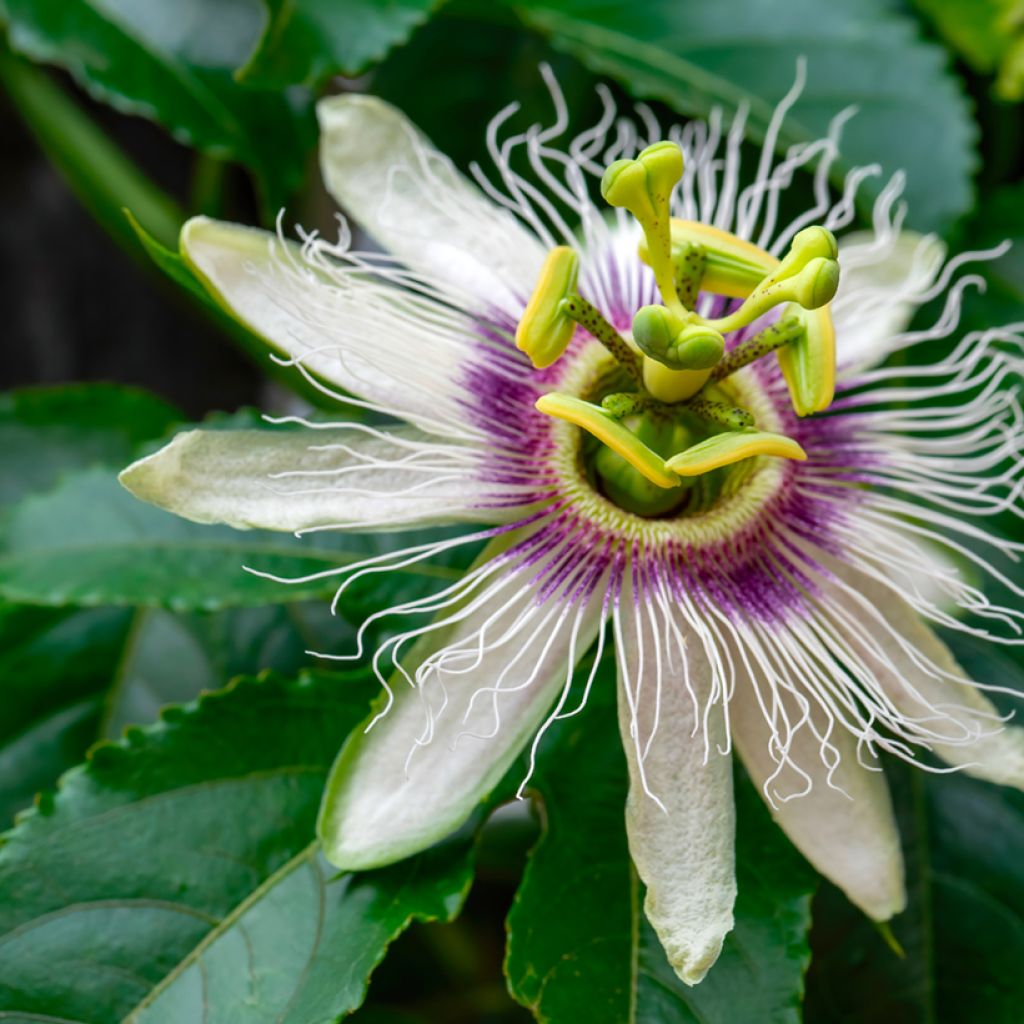Shipping country and language
Your country of residence may be:
Your country of residence is:
For a better user experience on our website, you can select:
Your shipping country:
-
Andorra
-
Austria
-
Belgium
-
Bulgaria
-
Canada
-
Chile
-
Croatia
-
Cyprus
-
Czechia
-
Denmark
-
Estonia
-
Finland
-
France
-
Germany
-
Greece
-
Hungary
-
Iceland
-
Ireland
-
Italy
-
Latvia
-
Lithuania
-
Luxembourg
-
Malta
-
Monaco
-
Netherlands
-
Poland
-
Portugal
-
Romania
-
Slovakia
-
Slovenia
-
Spain
-
Sweden
-
Switzerland
-
United Kingdom
We only deliver seed and bulb products to your country. If you add other products to your basket, they cannot be shipped.
Language:
-
French
-
German
-
Spanish
-
English
-
Italian
My Account
Hello
My wish lists
Log in / Register
Existing customer?
New customer?
Create an account to track your orders, access our customer service and, if you wish, make the most of our upcoming offers.


Passiflora edulis seeds


Passiflora edulis seeds


Passiflora edulis seeds


Passiflora edulis seeds
Passiflora edulis seeds
Passiflora edulis
Passion fruit, Purple granadilla
Order in the next for dispatch today!
Dispatch by letter from €3.90.
Delivery charge from €5.90 Oversize package delivery charge from €6.90.
More information
This item is not available in your country.
Schedule delivery date,
and select date in basket
This plant carries a 6 months recovery warranty
More information
We guarantee the quality of our plants for a full growing cycle, and will replace at our expense any plant that fails to recover under normal climatic and planting conditions.
Seed-only orders are dispatched by sealed envelope. The delivery charge for seed-only orders is €3.90.
Does this plant fit my garden?
Set up your Plantfit profile →
Description
Passiflora edulis, known as Passion Flower, Maracudja or Grenadille, is a charming exotic climber with magnificent fragrant flowers and tasty fruits. Mainly cultivated for its edible fruits, filled with sweet and tangy pulp, it brings all the charm of the Tropics to the terrace or veranda. In our climate, it should be grown in a pot, allowing it to be moved indoors in winter, as it does not tolerate temperatures below 10°C.
Originally from South America, Passiflora edulis belongs to the Passifloraceae family, like all passion flowers. In the wild, it thrives in tropical and subtropical regions, easily climbing on trees and other supports. In cultivation, it can reach up to 4 metres in height. Its evergreen foliage consists of trilobed, shiny green leaves measuring 10 to 20 cm. It is decorative throughout the year. This is a self-fertile species that does not require a partner to fruit.
The plant blooms all summer, from June to September. Its approx 5 cm in diameter flowers are white and mauve, with a crown of contrasting purple and white fringed filaments. Pollinated by bees, they give way to ovoid fruits 4 to 6 cm in length, with a sweet and slightly tangy flavour and a delightful exotic aroma. Harvest when the browned skin is slightly wrinkled at the end of summer, from August to October. The juicy and gelatinous pulp contains numerous small black seeds. The fruits are eaten raw, as juice, in ice creams, mousses, fruit salads, or simply on their own, halved and enjoyed with a spoon. They are renowned for their numerous medicinal virtues: antioxidant, rich in vitamins A and C, potassium, fibres, flavonoids, etc.
The Grenadille is perfect for decorating a terrace or balcony. It can be trained on a trellis or any other sturdy structure to create an exotic green screen. Combine it with other tender climbers like Dipladenia (Mandevilla), Bougainvillea, Arabian Jasmine or Solanum jasminoides. Together, these plants will create an exotic atmosphere. This passion flower is also highly appreciated in conservatories where it spends cold winters.
Report an error about the product description
Passiflora edulis seeds in pictures






Flowering
Foliage
Plant habit
Botanical data
Passiflora
edulis
Passifloraceae
Passion fruit, Purple granadilla
South America
Planting and care
Sow the seeds of Passiflora edulis in spring, when temperatures stabilise around 20 to 25°C. Before sowing, soak the seeds in warm water for 24 to 48 hours to soften their shell and accelerate germination. Prepare a light and well-drained substrate, composed of a mix of potting soil and sand (about 20% sand). Sow the seeds at a depth of 1 to 2 cm in pots or a seed tray, and place them in a warm place, ideally a greenhouse or propagator. Maintain constant humidity without saturating the soil. Germination can take between 2 and 4 weeks, or longer depending on conditions. Once the seedlings are sufficiently developed (3 to 4 leaves), they can be transplanted into larger pots.
Passiflora edulis should be grown in a large pot (at least 40 cm deep and 50 cm in diameter) to allow its roots to develop. The pot should have drainage holes to prevent excess water, and a layer of clay pebbles or gravel should be placed at the bottom. The substrate should be rich, light, and well-drained, consisting of potting soil, sand, and compost. Place the plant in a sunny location sheltered from cold winds, as it requires plenty of light to flower and fruit.
During the growth period (spring and summer), water regularly to keep the substrate slightly moist, but allow the surface to dry between waterings. In winter, reduce watering and place the plant in a conservatory or a bright room where the temperature stays above 10°C. Feed the plant every 15 days with a flowering plant fertiliser during the active growth period.
Sowing period
Intended location
This item has not been reviewed yet - be the first to leave a review about it.
Haven't found what you were looking for?
Hardiness is the lowest winter temperature a plant can endure without suffering serious damage or even dying. However, hardiness is affected by location (a sheltered area, such as a patio), protection (winter cover) and soil type (hardiness is improved by well-drained soil).

Photo Sharing Terms & Conditions
In order to encourage gardeners to interact and share their experiences, Promesse de fleurs offers various media enabling content to be uploaded onto its Site - in particular via the ‘Photo sharing’ module.
The User agrees to refrain from:
- Posting any content that is illegal, prejudicial, insulting, racist, inciteful to hatred, revisionist, contrary to public decency, that infringes on privacy or on the privacy rights of third parties, in particular the publicity rights of persons and goods, intellectual property rights, or the right to privacy.
- Submitting content on behalf of a third party;
- Impersonate the identity of a third party and/or publish any personal information about a third party;
In general, the User undertakes to refrain from any unethical behaviour.
All Content (in particular text, comments, files, images, photos, videos, creative works, etc.), which may be subject to property or intellectual property rights, image or other private rights, shall remain the property of the User, subject to the limited rights granted by the terms of the licence granted by Promesse de fleurs as stated below. Users are at liberty to publish or not to publish such Content on the Site, notably via the ‘Photo Sharing’ facility, and accept that this Content shall be made public and freely accessible, notably on the Internet.
Users further acknowledge, undertake to have ,and guarantee that they hold all necessary rights and permissions to publish such material on the Site, in particular with regard to the legislation in force pertaining to any privacy, property, intellectual property, image, or contractual rights, or rights of any other nature. By publishing such Content on the Site, Users acknowledge accepting full liability as publishers of the Content within the meaning of the law, and grant Promesse de fleurs, free of charge, an inclusive, worldwide licence for the said Content for the entire duration of its publication, including all reproduction, representation, up/downloading, displaying, performing, transmission, and storage rights.
Users also grant permission for their name to be linked to the Content and accept that this link may not always be made available.
By engaging in posting material, Users consent to their Content becoming automatically accessible on the Internet, in particular on other sites and/or blogs and/or web pages of the Promesse de fleurs site, including in particular social pages and the Promesse de fleurs catalogue.
Users may secure the removal of entrusted content free of charge by issuing a simple request via our contact form.
The flowering period indicated on our website applies to countries and regions located in USDA zone 8 (France, the United Kingdom, Ireland, the Netherlands, etc.)
It will vary according to where you live:
- In zones 9 to 10 (Italy, Spain, Greece, etc.), flowering will occur about 2 to 4 weeks earlier.
- In zones 6 to 7 (Germany, Poland, Slovenia, and lower mountainous regions), flowering will be delayed by 2 to 3 weeks.
- In zone 5 (Central Europe, Scandinavia), blooming will be delayed by 3 to 5 weeks.
In temperate climates, pruning of spring-flowering shrubs (forsythia, spireas, etc.) should be done just after flowering.
Pruning of summer-flowering shrubs (Indian Lilac, Perovskia, etc.) can be done in winter or spring.
In cold regions as well as with frost-sensitive plants, avoid pruning too early when severe frosts may still occur.
The planting period indicated on our website applies to countries and regions located in USDA zone 8 (France, United Kingdom, Ireland, Netherlands).
It will vary according to where you live:
- In Mediterranean zones (Marseille, Madrid, Milan, etc.), autumn and winter are the best planting periods.
- In continental zones (Strasbourg, Munich, Vienna, etc.), delay planting by 2 to 3 weeks in spring and bring it forward by 2 to 4 weeks in autumn.
- In mountainous regions (the Alps, Pyrenees, Carpathians, etc.), it is best to plant in late spring (May-June) or late summer (August-September).
The harvesting period indicated on our website applies to countries and regions in USDA zone 8 (France, England, Ireland, the Netherlands).
In colder areas (Scandinavia, Poland, Austria...) fruit and vegetable harvests are likely to be delayed by 3-4 weeks.
In warmer areas (Italy, Spain, Greece, etc.), harvesting will probably take place earlier, depending on weather conditions.
The sowing periods indicated on our website apply to countries and regions within USDA Zone 8 (France, UK, Ireland, Netherlands).
In colder areas (Scandinavia, Poland, Austria...), delay any outdoor sowing by 3-4 weeks, or sow under glass.
In warmer climes (Italy, Spain, Greece, etc.), bring outdoor sowing forward by a few weeks.
